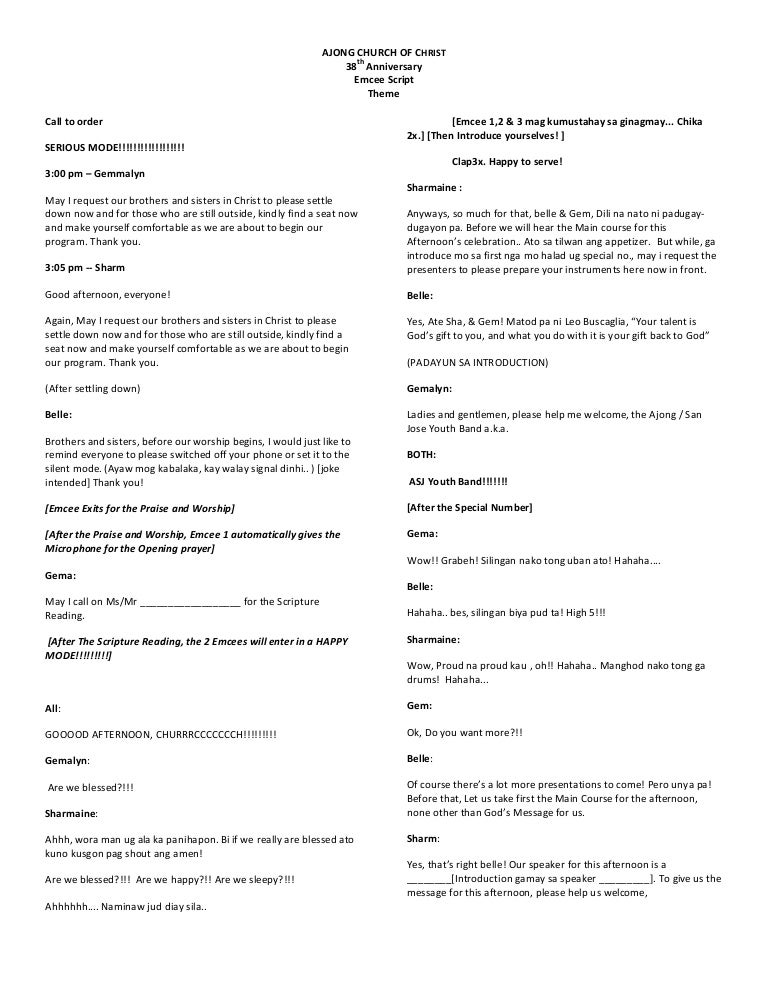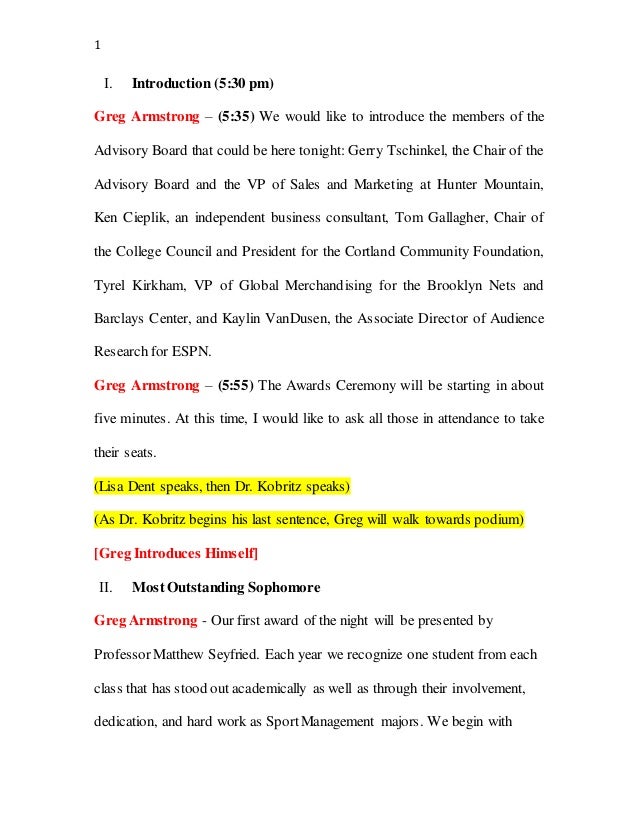Emceeing A Program
Emceeing a program keyword after analyzing the system lists the list of keywords related and the list of websites with related content, in addition you can see which keywords most interested customers on the this website.
- 'The laptop requirements for Emcee Pro are minimal. I always tell anyone that whatever is on sale this week will do just fine. By that I mean that if a computer will run Windows XP, then it will run Emcee Pro.
- Emcee Script for School Program Emcee Script for Seminar Emcee Script for Opening Ceremony Emcee Script for Event Emcee Script for Wedding you’ll find some useful bits here. In the Resource you will find snippets that can be used for Emcee Greetings Emcee Opening Remarks Introducing Speakers Thanking Speakers Emcee Closing Comments.
A master of ceremonies, abbreviated MC, is the official host of a ceremony, staged event or similar performance.
The term is earliest documented in the Catholic Church since the 5th century, where the Master of Ceremonies was and still is an official of the Papal Court responsible for the proper and smooth conduct of the elegant and elaborate rituals involving the Pope and the sacred liturgy.
The master of ceremonies sometimes also refers to the protocol officer during an official state function, especially in monarchies.
Today, the term is often used to connote a compère (for a male, or commère, for a female), which corresponds to a master of ceremonies who presents performers, speaks to the audience, entertains people, and generally keeps an event moving. This usage occurs in the entertainment industry, including for television game show hosts, as well as in contemporary hip hop and electronic dance music culture.

In addition, the term also exists in various chivalric orders and fraternal orders.
- 7In music and cultural events
Name[edit]
Alternative names include compère, announcer, and microphone controller.
Catholic Church[edit]
Emcee Script For A Program
The term originated in the Catholic Church. The Master of Ceremonies is an official of the Papal Court responsible for the proper and smooth conduct of the elegant and elaborate rituals involving the Pope and the sacred liturgy. He may also be an official involved in the proper conduct of protocols and ceremonials involving the Roman Pontiff, the Papal Court, and other dignitaries and potentates. Examples of official liturgical books prescribing the rules and regulations of liturgical celebrations are Cæremoniale Romanum and Cæremoniale Episcoporum.
The office of the Master of Ceremonies itself is very old. According to the Catholic Encyclopedia, the most ancient ceremonials and rituals of the Catholic Church are the Ordines Romani.[1] Names of Masters of Ceremonies are known since the late Middle Ages (15th century) and the Renaissance (16th century). However, copies of books prescribing the forms of rituals, rites and customs of pontifical ceremonies are known to have been given to Charles Martel in the 8th century. The rules and rituals themselves are known to have been compiled or written by the pontifical masters of ceremonies, dating back to the time of Pope Gelasius I (492–496) with modifications and additions made by Pope Gregory the Great (590–604). It is reasonable to assume that the ceremonials themselves pre-date Gelasius. The duties of the Master of Ceremonies may have developed from the time Emperor Constantine the Great gave the Lateran Palace to the popes (324) or from the time Christianity became the official religion of the Roman Empire (380), and were no doubt influenced by imperial practices, customs and norms. However, documentary evidence from the late Roman period is scarce or lost. The ceremonies and practices of the Byzantine emperors are also known to have influenced the papal court. The accumulation of elaborations and complications since the Renaissance and Baroque eras continued well into the 20th century, until some of the ceremonies (i.e. the court, the rituals and norms) were simplified or completely eliminated by Pope Paul VI in the 1970s after Vatican II; much of the Renaissance pomp and ceremony has been completely abandoned by the popes of the modern era.
At a large Catholic church or cathedral, the Master of Ceremonies organizes and rehearses the proceedings and ritual of each Mass. He may also have responsibility for the physical security of the place of worship during the liturgy. At major festivities such as Christmas and Easter, when the liturgies are long and complex, the Master of Ceremonies plays a vital role in ensuring that everything runs smoothly.
The current papal Master of Ceremonies is Monsignor Guido Marini, who succeeded Archbishop Piero Marini (to whom he is not related).
Monarchies[edit]
Historically certain European royal courts maintained senior offices known as Masters of Ceremonies (or some variant thereof), responsible for conducting stately ceremonies such as coronations and receptions of foreign ambassadors. Examples included:
- Spanish Empire: Maestro de Ceremonias
- British Empire: Master of the Ceremonies
- France: Grand Master of Ceremonies
- Japan: Master of Ceremonies[2]
- Russian Empire: see Table of Ranks
- Ottoman Empire: Kapıcıbaşı, literally 'chief doorkeeper' of the Topkapi Palace
Orders[edit]
The function is prevalent in the culture of chivalric orders, as well as in more modern fraternal orders, such as Freemasons and Odd Fellows.
Corporate[edit]
Most large corporate and association conferences and conventions use an MC to keep the events running smoothly. This role is sometimes performed by someone inside the group but usually by an outside professional expert MC. Their role could include - introducing and thanking speakers, introducing the theme of the conference, facilitating a panel discussion & interviewing guests.[3]

Weddings[edit]
During the wedding reception, the multifaceted responsibility of the Master of Ceremony (MC) is to keep the agenda flowing smoothly[4] by:
- skillfully capturing and maintaining the attention of the wedding guests
- effectively directing their attention on whatever the bride and groom have chosen to include
- keeping the wedding attendees informed so at any given moment they know what is happening
- comfortably guiding the bride's and groom's friends and family so they know what they are supposed to do to participate
The role of the wedding master of ceremonies incorporates a wide range of skills, and those who serve in this capacity have frequently undergone extensive training in the following areas:
- Delivering applause cues
- Presenting introductions
- Microphone technique
- Posture and stance
- Voice inflection
Masters of ceremonies at weddings and private events also ensure the coordination of their event, including liaison with catering staff.
In music and cultural events[edit]
In hip hop and electronic dance music, 'MC' refers to rap artists or performers who perform vocals for their own or other artist's original material. Such genres of electronic dance music where MCs perform on are house, drum and bass, and UK garage.

Hip hop[edit]
In the late 1970s, the term emcee, MC or M.C.,[5][6] became an alternative title for a rapper and for their role within hip hop music and culture. However, initially M.C.s (Masters of Ceremony) were those who introduced the DJs to the crowd and explained what was taking place during the event. Often these events were parties at locations including clubs or outdoor public spaces. The term is typically used as a term of distinction, referring to an artist with good performance skills.[7] An MC focuses on skills, lyrical ability, and subject matter. Performers using 'MC' in their stage names include:
- Father MC, the stage name for American rapper Timothy Brown
- MC Breed, the stage name for American rapper Eric Breed
- MC Chris, the stage name for American rapper Christopher Brendan Ward
- MC Eiht, the stage name for American rapper Aaron Tyler
- MC Frontalot, the stage name for American rapper Damian Hess
- MC Hammer, the stage name for American rapper Stanley Kirk Burrell
- MC HotDog, the stage name for Taiwanese rapper Yao Chung-jen
- MC Jin, the stage name for Hong Kong American rapper Jin Au-Yeung
- MC Lars, the stage name for American rapper Andrew Robert Nielsen
- MC Lyte, the stage name for American rapper Lana Michele Moorer
- MC Ren, the stage name for American rapper Lorenzo Jerald Patterson
- Young MC, the stage name for English rapper Marvin Young
- MC Magic, the stage name for Mexican rapper Marco Cardenas
- MC Ride, the stage name for American rapper Stefan Corbin Burnett
- MC Shan, the stage name for American rapper Shawn Moltke
- MC Tee, the stage name for Jamaican American rapper Touré Embden
- MCA, the stage name for American rapper Adam Nathaniel Yauch
Comedy clubs[edit]
In the context of a comedy club, the role of MC is traditionally filled by a 'compère'. In any comedy show, the compère is the host of the evening's events, but the precise role and responsibilities will vary depending on the country, venue, and style of event. The compère is usually a working comedian, and whilst they may incorporate elements of their regular set, the role broadly requires a greater level of improvisation – creating a sense of place and community, interacting with the audience, dealing with any hecklers, and encouraging them to focus on the other acts. The compère will normally do longer bits at the start of the show and after any interval, and shorter bits between acts. They may also be required to make announcements, such as birthdays, anniversaries, and bar promotions.
Other[edit]
In some circles the title 'Master of Ceremonies' is also known as 'Minister of Ceremonies.'
In the 1940 Disney film, Fantasia, Deems Taylor is the film's Master of Ceremonies.
In the role-playing game Apocalypse World, the game master is named Master of Ceremonies (MC)[8].
References[edit]
- ^'Catholic Encyclopedia: Ceremonial'. Newadvent.org. 1908-11-01. Retrieved 2010-06-10.
- ^Imperial Household Agency: Organization and Functions
- ^'What is a Corporate MC and what do they do?'. expertmc.com. Retrieved 13 July 2017.
- ^'Wedding Master of Ceremonies'. Music on the Strand's DJ ENTERTAINMENT. Myrtle Beach, Florida, USA: Music on the Strand. Archived from the original on 2016-03-04. Retrieved 2013-06-03.
- ^Harper, Douglas. 'emcee'. Online Etymology Dictionary. Retrieved 2013-04-02.
- ^'The Emcee[MC] Master of Ceremonies to Mic Controller by Gradmaster Caz'. www.daveyd.com. Retrieved 2017-12-10.
- ^Edwards, Paul, 2009, How to Rap: The Art & Science of the Hip-Hop MC, Chicago Review Press, p. xii.
- ^Baker, D. Vincent (2010). Apocalypse World. Lumpley Games. ISBN978-0976904212.
External links[edit]
- Media related to Master of ceremonies at Wikimedia Commons